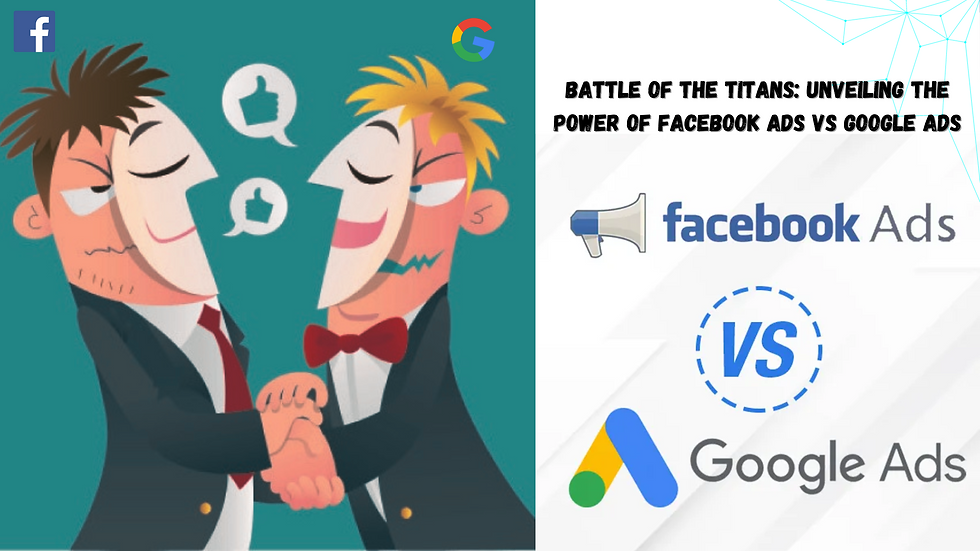Battle Of The Titans: Unveiling the Power of Facebook Ads vs Google Ads
- wiltonnorris4110
- Mar 6, 2024
- 4 min read

In the digital media landscape, two titans stand supreme: Facebook Ads and Google Ads. Both platforms boast immense power, capable of shaping brand awareness, driving conversions, and propelling businesses to new heights. But with distinct strengths and target audiences, deciding which platform reigns supreme in your marketing strategy can be a daunting task.
This guide delves into the core functionalities of Facebook ads vs Google ads, unveiling their unique capabilities and guiding you toward the platform that best aligns with your marketing goals. Through a comprehensive analysis of their targeting options, campaign formats, and bidding strategies, we'll equip you with the knowledge to confidently navigate the battlefield and emerge victorious in the war for online dominance.
Key Differences between Facebook Ads and Google Ads
At the core, Facebook and Google ads serve different purposes in the user journey. Google Ads are intent-driven, appearing when users actively search for a product or service. On the other hand, Facebook ads are interruption-based, displaying content to users based on their interests, demographics, and online behavior.
The primary difference lies in user intent. Google ads target users with a clear intention to find information or make a purchase, while Facebook ads aim to capture attention and generate interest. This fundamental distinction impacts the way businesses approach their advertising strategies on each platform.
Targeting Variations between Facebook and Google Advertising Platforms
The targeting capabilities of Facebook and Google ads are distinct, reflecting their different approaches to user data. Facebook relies on user-generated data, allowing advertisers to target audiences based on interests, demographics, and behaviors. Google, on the other hand, leverages search data, enabling advertisers to reach users actively searching for specific keywords.
In terms of precision, Facebook ads offer granular targeting options, allowing businesses to define their audience with unparalleled specificity. Google ads, while precise, rely on keyword relevance to match ads with user searches. The choice between the two depends on the nature of the business and the desired level of targeting granularity.
Audience Engagement: Facebook vs Google
The battle for audience engagement pits Facebook's social-centric model against Google's search-driven approach. Facebook excels in fostering engagement through likes, shares, comments, and other social interactions. Brands find success in building communities and relationships on Facebook, leveraging the platform's social nature.
Google, on the other hand, thrives in capturing users at the moment of intent. Ads displayed during a search query are more likely to lead to immediate actions, such as clicks or conversions. The effectiveness of audience engagement depends on the marketing goals – building a community (Facebook) or capturing immediate conversions (Google).
Businesses and Products: Facebook Ads vs Google Ads
The ideal platform for advertising depends on the nature of the business and its target audience. E-commerce and retail businesses often find success with Facebook ads due to the visual nature of the platform and its robust targeting options. Conversely, service-based industries or businesses reliant on immediate conversions may find Google ads more effective, given their intent-driven nature.
Products or services with a strong visual appeal and a focus on brand building may benefit more from Facebook ads, where storytelling and emotional connection play a significant role. In contrast, Google ads are a powerhouse for businesses that rely on immediate user intent, such as emergency services, repair services, or specific product searches.
Cost Structures: Running Ads on Facebook and Google
Understanding the cost structures of Facebook and Google ads is vital for budget allocation. Facebook typically charges advertisers based on impressions (CPM) or engagement (CPC), offering flexibility in budgeting. Google, on the other hand, operates on a pay-per-click (PPC) model, where advertisers pay only when users click on their ads.
The cost-per-click (CPC) on Google ads can vary significantly based on keyword competitiveness and industry, making it imperative for businesses to manage budgets effectively. In contrast, Facebook's cost structure allows advertisers to experiment with lower budgets, making it a more accessible option for small and medium-sized businesses.
Ad Formats: Impact on Campaign Performance
The ad formats on Facebook and Google contribute significantly to campaign performance. Facebook proposes a wide range of ad formats, including image ads, video ads, carousel ads, and many more. The visual appeal and storytelling opportunities make Facebook ads effective for brand building and engagement.
Google, on the other hand, primarily offers text-based ads, display ads, and video ads through YouTube. The simplicity of Google's ad formats aligns with user intent, providing information directly related to the user's search query. The impact on campaign performance depends on the marketing goals – building brand awareness (Facebook) or driving immediate actions (Google).
You Can Also Watch:
Closing
The battle of Facebook ads vs Google ads ultimately depends on the goals and nature of the business. Combining both platforms strategically can create a powerful marketing mix, leveraging the strengths of each to reach a diverse audience. As the digital landscape evolves, businesses must stay agile, adapting their advertising strategies to harness the full potential of these titans in the digital marketing arena.




Comments